We are excited to announce the 2016 Association for Mormon Letters awards finalists in the Creative Non-fiction and Religious Non-fiction categories. Middle Grade Novel, Young Adult Novel, Poetry, Short Fiction, Comics, Novel, and Picture Books finalists were announced previously, and we will be announcing the Drama, Film, and Video Series finalists shortly. The final awards will be announced and presented at the AML Conference at Utah Valley University on April 22. The finalists and winners are chosen by juries of authors and critics. The finalist announcements include blurbs about each of the books and author biographies, from the author and publisher websites.
“Creative Non-fiction” includes memoirs and collections of personal essays. “Religious Non-fiction” refers to a wide variety of LDS religious studies books, including scriptural studies, theology, and devotional literature. The category does not include histories or biographies, as we figure that the Mormon Historical Association already does a good job of recognizing those books.
Creative Non-fiction
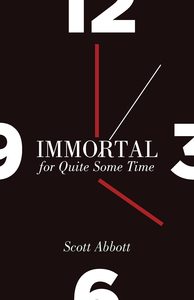 Scott Abbott. Immortal for Quite Some Time. University of Utah Press.
Scott Abbott. Immortal for Quite Some Time. University of Utah Press.
“This is not a memoir. Rather, this is a fraternal meditation on the question ‘Are we friends, my brother?’ The story is uncertain, the characters are in flux, the voices are plural, the photographs are as troubled as the prose. This is not a memoir.” Thus Scott Abbott introduces the reader to his exploration of the life of his brother John, a man who died of AIDS in 1991 at the age of forty. Writing about his brother, he finds he is writing about himself and about the warm-hearted, educated, and homophobic LDS family that forged the core of his identity. Images and quotations are interwoven with the reflections, as is a critical female voice that questions his assertions and ridicules his rhetoric. The book moves from the starkness of a morgue’s autopsy through familial disintegration and adult defiance to a culminating fraternal conversation. This exquisitely written work will challenge notions of resolution and wholeness.
Scott Abbott is professor of humanities, philosophy, and integrated studies at Utah Valley University.
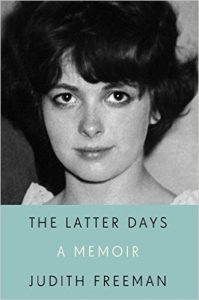 Judith Freeman. The Latter Days: A Memoir. Pantheon.
Judith Freeman. The Latter Days: A Memoir. Pantheon.
An arresting, lyrical memoir about the path the author took—sometimes unwittingly—out of her Mormon upbringing and through a thicket of profound difficulties to become a writer. At twenty-two, Judith was working in the Mormon church–owned department store in the Utah town where she’d grown up. In the process of divorcing the man she had married at seventeen, she was living in her parents’ house with her four-year-old son, who had already endured two heart surgeries. She had abandoned Mormonism, the faith into which she had been born, and she was having an affair with her son’s surgeon, a married man with three children of his own. It was at this fraught moment that she decided to become a writer. In this moving memoir, Freeman explores the circumstances and choices that informed her course, and those that allowed her to find a way forward. Writing with remarkable candor and insight, she gives us an illuminating, singular portrait of resilience and forgiveness, of memory and hindsight, and of the ways in which we come to identify our truest selves.
Judith Freeman is the author of four novels—Red Water, The Chinchilla Farm, Set for Life, and A Desert of Pure Feeling—and of Family Attractions, a collection of stories, and The Long Embrace, a biography of Raymond Chandler. She lives in California and Idaho.
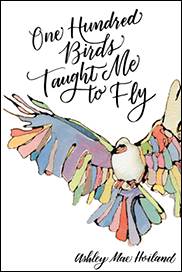 Ashley Mae Hoiland. One Hundred Birds Taught me to Fly. Neal A. Maxwell Institute for Religious Scholarship.
Ashley Mae Hoiland. One Hundred Birds Taught me to Fly. Neal A. Maxwell Institute for Religious Scholarship.
One Hundred Birds Taught Me to Fly is for restless souls who desire to know God more deeply. Ashley Mae Hoiland bids us follow her down the hallowed and well-trodden path between the heart and mind, where glimpses of godliness are discovered in rainstorms, bus rides, temples, and mountains. As a Latter-day Saint, Hoiland explores the complexities of faith in everyday life where laughter and creativity matter as much as faith, hope, and charity.
Ashley Mae Hoiland received a bachelor of fine arts degree in studio arts and a master of fine arts degree in poetry from Brigham Young University in Provo, Utah. She teaches art in low-income elementary schools in California and has written and illustrated several children’s books. She is founder of We Brave Women—an initiative to educate youth about important historic and contemporary women.
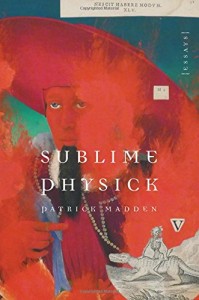 Patrick Madden. Sublime Physick. University of Nebraska Press.
Patrick Madden. Sublime Physick. University of Nebraska Press.
This introspective and exuberant collection of essays is wide-ranging and wild, following bifurcating paths of thought to surprising connections. Madden seeks what is common and ennobling among seemingly disparate, even divisive, subjects, ruminating on midlife, time, family, forgiveness, loss, originality, a Canadian rock band, and much more, discerning the ways in which the natural world (fisica) transcends and joins the realm of ideas (sublime) through the application of a meditative mind. In twelve essays that straddle the classical and the contemporary, Madden transmutes the ruder world into a finer one, articulating with subtle humor and playfulness how science and experience abut and intersect with spirituality and everyday life.
Patrick Madden is an associate professor at Brigham Young University. His first collection of essays, Quotidiana (Nebraska, 2010), won awards from the Association for Mormon Letters and ForeWord magazine and was a finalist for the 2011 PEN Center USA Literary Award. His essays have appeared in a variety of periodicals as well as in The Best Creative Nonfiction and The Best American Spiritual Writing anthologies. He is coeditor of After Montaigne: Contemporary Essayists Cover the Essays
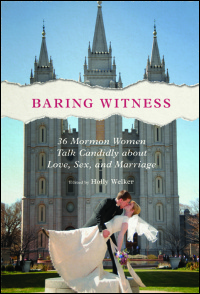 Holly Welker, editor. Baring Witness: 36 Mormon Women Talk Candidly about Love, Sex and Marriage. University of Illinois Press.
Holly Welker, editor. Baring Witness: 36 Mormon Women Talk Candidly about Love, Sex and Marriage. University of Illinois Press.
In Baring Witness, Holly Welker and thirty-six Mormon women write about devotion and love and luck, about the wonder of discovery, and about the journeys, both thorny and magical, to humor, grace, and contentment. They speak to a diversity of life experiences: what happens when one partner rejects Church teachings; marrying outside one’s faith; the pain of divorce and widowhood; the horrors of spousal abuse; the hard journey from visions of an idealized marriage to the everyday truth; sexuality within Mormon marriage; how the pressure to find a husband shapes young women’s actions and sense of self; and the ways Mormon belief and culture can influence second marriages and same-sex unions. The result is an unflinching look at the earthly realities of an institution central to Mormon life.
Holly Welker is an award-winning poet and essayist living in Arizona. Her work has appeared in the New York Times, Dialogue: A Journal of Mormon Thought, Best American Essays, and other publications.
Religious Non-fiction
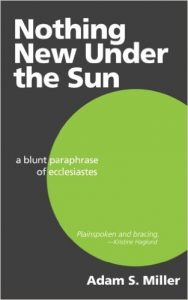 Adam S. Miller. Nothing New Under the Sun: A Blunt Paraphrase of Ecclesiastes. Self-published.
Adam S. Miller. Nothing New Under the Sun: A Blunt Paraphrase of Ecclesiastes. Self-published.
“You won’t like this book. Ecclesiastes is gloomy, skeptical, and irreverent. It is caustic and drolly splenetic. It is unapologetically human. It refuses to abet our hunger for clean narratives and happy endings. It is a hopeless book. Insisting on life’s futility, the world’s capriciousness, and God’s inscrutability, it deliberately cultivates despair. It sees such bone-deep hopelessness as the only cure for what ails us. Ecclesiastes is a hard book full of hard sayings. It is an anvil against which our hearts must be hammered. No wonder we avoid it. But the cost of avoidance is high. As Paul insists, in order to become Christian, we must first learn to be hopeless. Hopelessness is the door to Zion. Hopelessness is crucial to a consecrated life. Before we can find hope in Christ, we must give up hope in everything else.” In “Nothing New Under the Sun,” Adam S. Miller provides a sharp, contemporary paraphrase of Ecclesiastes, continuing to work in the same vein as the popular “Grace is Not God’s Backup Plan: An Urgent Paraphrase of Paul’s Letter to the Romans” (2015).
Adam S. Miller is a professor of philosophy at Collin College in McKinney, Texas. He and his wife, Gwen, have three children. He received an MA and PhD in philosophy from Villanova University as well as a BA in Comparative Literature from Brigham Young University. He is the editor of An Experiment on the Word (2011) and the author of Badiou, Marion, and St Paul: Immanent Grace (2008), Rube Goldberg Machines: Essays in Mormon Theology (2012), Speculative Grace: Bruno Latour and Object-Oriented Theology (2013), Letters to a Young Mormon (2014), Grace is Not God’s Backup Plan: An Urgent Paraphrase of Paul’s Letter to the Romans (2015), and The Gospel According to David Foster Wallace: Boredom and Addiction in an Age of Distraction (2016). He is the co-editor of the book series Groundwork: Studies in Theory and Scripture, published by the Neal A. Maxwell Institute for Religious Scholarship.
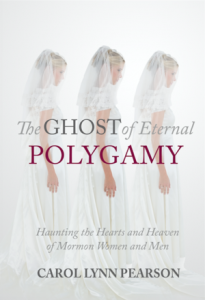 Carol Lynn Pearson. The Ghost of Eternal Polygamy. Self-published.
Carol Lynn Pearson. The Ghost of Eternal Polygamy. Self-published.
“Polygamy?” says the mainstream Mormon Church. “We gave that up long ago.” Not so, claims noted LDS poet and author Carol Lynn Pearson, who examines the issue as it has never been examined before. Any member of the LDS Church today who enters the practice of polygamy is immediately excommunicated. However, Pearson claims, polygamy itself has never been excommunicated, but has an honored and protected place at the table. It has only been postponed, a fact confirmed by thousands of “eternal sealings” giving a man an assurance that he will claim as wives in heaven the two, three, or even more women he has sequentially married during his lifetime. No such opportunity is available to women. Through her own personal stories, those of her ancestors, and the thousands of stories that came to her through an Internet survey, Pearson shows the power of the Ghost of Eternal Polygamy as it not only waits on the other side to greet the most righteous in heaven, but also haunts the living—hiding in the recesses of the Mormon psyche.
Carol Lynn Pearson is the author of more than 40 books and plays that together have sold more than 800,000 copies—autobiography, inspiration, humor, poetry, and fiction. Her poetry volumes include Beginnings, and Women I Have Known and Been. Most of the poems from the earlier books now appear in a compilation, Beginnings and Beyond. Her memoir Goodbye, I Love You tells the story of her marriage to a gay man, their divorce, ongoing friendship, and her caring for him as he died of AIDS. She has written several plays, including the musical My Turn on Earth, and Facing East, which opened Off Broadway in 2007. She resides in Walnut Creek, California.
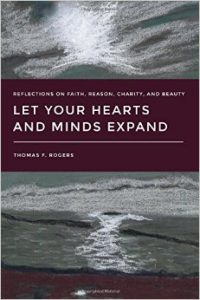 Thomas F. Rogers. Let Your Hearts and Minds Expand: Reflections on Faith, Reason, Charity, and Beauty Edited by Jonathan Langford and Linda Hunter Adams. Neal A. Maxwell Institute for Religious Scholarship.
Thomas F. Rogers. Let Your Hearts and Minds Expand: Reflections on Faith, Reason, Charity, and Beauty Edited by Jonathan Langford and Linda Hunter Adams. Neal A. Maxwell Institute for Religious Scholarship.
Thomas F. Rogers has lived his faith all over the world. The experiences he relates from far-flung places, mingled with thirty-one years as a BYU professor of Russian, offer remarkable insight into the hard work always involved when we practice charity, “the pure love of Christ.” This book is a spiritually and intellectually stimulating collection of essays, articles, letters, poetry, and art exploring the dimensions of faith, reason, charity, and beauty. Rogers is a defender of the faith, but his book moves us well beyond typical apologetics. His Mormonism serves as the bedrock for discussions on the life of the mind, the value of literature, and the challenges of religious orthodoxy. A common thread is the journey of those who have become disenchanted with their faith. Souls who, according to Rogers, have often been gifted, even brilliant. Having asked all the right questions, they have somehow found themselves on the outside, uncertain if they want to come back. Rogers speaks to them, and to that part in each of us, calling for reasonable, faithful, even joyful, reunion.
Thomas F. Rogers is a noted playwright, essayist, and scholar who taught Russian at Brigham Young University from 1969 to 2000. He also served as director of the BYU Honors Program in the 1970s. From 1993 to 1996, he was president of the LDS Church’s Russia St. Petersburg Mission, the subject of his memoir A Call to Russia: Glimpses of Missionary Life (1999). Subsequently, he and his wife, Merriam, served in the Stockholm Sweden Temple. From 2007 until his release in 2014, Rogers was a traveling LDS patriarch assigned to the LDS Church’s Europe East Area. Tom and Merriam currently live in Bountiful, Utah, where he spends time painting and visiting their seven children and forty grandchildren.
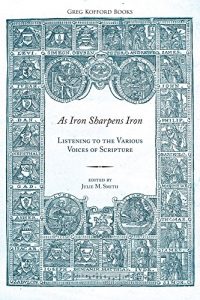 Julie M. Smith, editor. As Iron Sharpens Iron: Listening to the Various Voices of Scripture. Greg Kofford Books. Contributors: Julie M Smith, Michael Austin, Mark T. Decker, Nicholas J. Frederick, Heather Hardy, Ronan James Head, James D. Holt, Jason A. Kerr, Jared Ludlow, Steven L. Peck, Joseph M. Spencer, Walter E. A. van Beek, Miranda Wilcox, Walker Wright, Benjamin Peters, and John Durham Peters.
Julie M. Smith, editor. As Iron Sharpens Iron: Listening to the Various Voices of Scripture. Greg Kofford Books. Contributors: Julie M Smith, Michael Austin, Mark T. Decker, Nicholas J. Frederick, Heather Hardy, Ronan James Head, James D. Holt, Jason A. Kerr, Jared Ludlow, Steven L. Peck, Joseph M. Spencer, Walter E. A. van Beek, Miranda Wilcox, Walker Wright, Benjamin Peters, and John Durham Peters.
In this unique volume, fictionalized dialogues between the various voices of scripture illustrate how these differences and disagreements are not flaws of the texts but are rather essential features of the canon. These creative dialogues include Abraham and Job debating the utility of suffering and our submission to God, Alma and Abinidi disagreeing on the place of justice in the Atonement, and the authors Mark and Luke discussing the role of women in Jesus’s ministry. It is by examining and embracing the different perspectives within the canon that readers are able to discover just how rich and invigorating the scriptures can be. The dialogues within this volume show how just as “iron sharpeneth iron,” so can we sharpen our own thoughts and beliefs as we engage not just the various voices in the scriptures but also the various voices within our community (Proverbs 27:17).
Julie M. Smith graduated from the University of Texas at Austin with a BA in English and from the Graduate Theological Union in Berkeley, CA, with an MA in Biblical Studies. She is on the executive board of the Mormon Theology Seminar and the steering committee of the BYU New Testament Commentary series, for which she is writing the volume on the Gospel of Mark. She is author of Search, Ponder, and Pray: A Guide to the Gospels and editor of Apocalypse: Reading Revelation 21–22. She also writes for Times & Seasons, where she is the book review editor. She lives near Austin, Texas, where she homeschools her children.
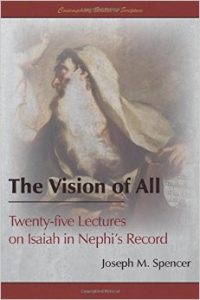 Joseph M. Spencer. The Vision of All: Twenty-five Lectures on Isaiah in Nephi’s Record. Greg Kofford Books.
Joseph M. Spencer. The Vision of All: Twenty-five Lectures on Isaiah in Nephi’s Record. Greg Kofford Books.
In The Vision of All, Joseph Spencer draws on the best of biblical and Latter-day Saint scholarship to make sense of the so-called “Isaiah chapters” in the first two books of the Book of Mormon. Arguing that Isaiah lies at the very heart of Nephi’s project, Spencer insists on demystifying the writings of Isaiah while nonetheless refusing to pretend that Isaiah is in any way easy to grasp. Presented as a series of down-to-earth lectures, The Vision of All outlines a comprehensive answer to the question of why Nephi was interested in Isaiah in the first place. Along the way, the book presents both a general approach to reading Isaiah in the Book of Mormon and a set of specific tactics for making sense of Isaiah’s writings. For anyone interested in understanding what Isaiah is doing in the Book of Mormon, this is the place to start.
Joseph M. Spencer is visiting assistant professor of Ancient Scripture at Brigham Young University. He currently serves as the associate director of the Mormon Theology Seminar and as an associate editor of the Journal of Book of Mormon Studies. He and Karen, his wife, live with their five children in Provo, Utah.

Great Ashley !!! You’ve already won by the way…
Love Dad